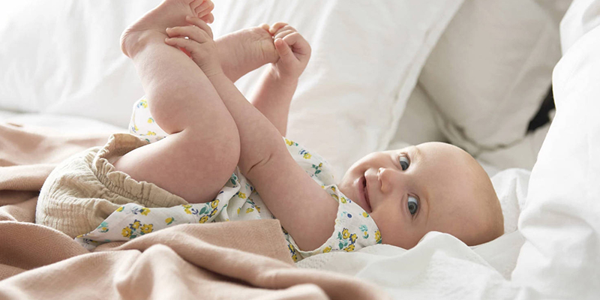Are you a new parent constantly fretting over your baby's milk intake? You're not alone. This common worry keeps many moms and dads up at night.
But here's the good news: your baby can tell you they're well-fed. You need to know what to look for.
Imagine the relief of knowing, without a doubt, that your little one is getting all the nourishment they need. It's possible, and it's simpler than you think.

In this post, we'll reveal seven signs that your baby is getting enough milk. These easy-to-spot indicators will help you gauge your baby's nutrition with confidence.
Keep reading. We will share valuable insights to make your parenting journey smoother.
Milk is like liquid gold for your little one. It's not just food; it's the foundation of their health and growth.
Your baby's body and brain develop at warp speed in those early months. The right amount of milk fuels this incredible transformation. It helps build strong bones, supports brain development, and boosts the immune system.
But here's the catch - babies can't tell us if they're getting enough. That's why knowing the signs is so important. Whether breastfeeding or using formula, these clues are your secret weapon.
Understanding these signs isn't just about peace of mind. It's about giving your baby the best start, watching them thrive and grow, and knowing you're doing everything right.
So, let's know about these tell-tale signs and become experts in baby nutrition together.
Now that we understand why proper milk intake is crucial let's get down to the nitty-gritty. How can you tell if your baby is getting enough? Don't worry; we've got you covered. Here are seven key signs to watch for:
Babies are like little growth machines, and milk is their fuel. A well-fed baby should steadily pack on the ounces.
Expect your little one to gain about 5-7 ounces weekly in the first few months. That's like adding a small apple to their weight every week!
Don't freak out if your baby loses a bit of weight right after birth. It's normal. They should be back to their birth weight by two weeks old.
Your paediatrician will track your baby's growth on a chart. These charts show whether your baby is growing at a healthy rate. Remember, every baby is unique. Some increase and others take their time.
Wet diapers are like your baby's personal hydration meter. More pee means more milk is going in.
In the first few days, expect one wet diaper for each day of life. By day five, you should change about 6-8 wet diapers daily.
Breastfed babies often have wetter diapers than formula-fed ones. Stay calm if you notice this difference.
If your baby's diaper output suddenly drops, it might be time to check in with your doctor. It could be a sign that your baby is not getting enough milk.
Let's talk poop. Yeah, it's gross, but it's essential. A well-fed baby is a pooping baby.
Newborns might poop after every feeding. That's normal. As they grow, it might slow down to once a day or even once a week for some breastfed babies.
The colour and consistency will change, too, from black tar-like poop in the first few days to yellow, seedy poop for breastfed babies or tan, paste-like poop for formula-fed ones.
If your baby's poop is hard or pellet-like, they might need more milk. Soft, mushy poop is what you're aiming for.
A well-fed baby is like a happy little battery - full of energy and ready to explore.
Look for bright, alert eyes during awake times. Your baby should be interested in faces and respond to sounds.

As they grow, expect more movement. Kicking, waving arms, and eventually rolling over are all signs of a well-nourished baby.
If your baby seems constantly lethargic or uninterested in their surroundings, it might be time to check their milk intake.
A baby getting enough milk will act like they've just had a Thanksgiving feast after feeding.
Look for relaxed hands and a content expression. They might even fall asleep at the breast or bottle.
Don't be alarmed by cluster feeding - when babies feed frequently for a few hours. It's normal and doesn't mean they're not getting enough.
If your baby seems constantly fussy or unsettled after feeding, they might still be hungry. Trust your instincts and offer more if needed.
A well-fed baby should have good colour and skin elasticity. Think peachy and plump, not pale and pinched.
Gently pinch your baby's skin. It should bounce back quickly. If it stays "tented," your baby might be dehydrated.
Watch out for a grey tinge to the skin or sunken eyes. These could be signs your baby needs more milk.
Remember, some babies are naturally fairer or darker. You're looking for changes from your baby's
standard colour.
A well-fed baby usually sleeps better. But expect 8-hour stretches later!
Newborns might sleep for 2-3 hours between feeds. As they grow, these stretches often get longer.
A hungry baby might wake more frequently or have trouble settling. Check their milk intake if your baby's sleep suddenly becomes more disrupted.
Remember, every baby is different. Some are naturally better sleepers than others. Look for patterns rather than comparing them to other babies.
While these signs are helpful, sometimes you need a pro's opinion. Don't hesitate to ring your paediatrician if something feels off.
Red flags to watch for:
● Your baby's not gaining weight or losing pounds
● They're always cranky or seem too sleepy
● You're changing way fewer wet diapers than usual
● Your little one seems dehydrated or malnourished
If you spot any of these, it's time to make that call. Better safe than sorry, right?
When you chat with the doctor, be specific. Keep a feeding diary for a few days. Note how often and how long your baby feeds, diaper changes, and any concerns. This info is gold for your paediatrician.
Remember, you know your baby best. If your gut says something's not right, speak up. Your paediatrician is there to help, not judge. Together, you'll ensure your little one's getting exactly what they need.
You've got the tools now. Use them. Your baby's health depends on it.
Take advantage of your baby's crucial milestones. Stay alert. Every wet diaper and every ounce gained matters.
You're not just feeding your baby. You're building their future, one milk drop at a time.
So, keep this checklist handy. Trust your instincts. And remember, you're doing great. Your baby's lucky to have you watching out for them.
Now go on, cuddle that little one. You've earned it!